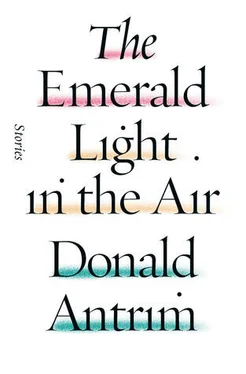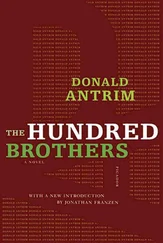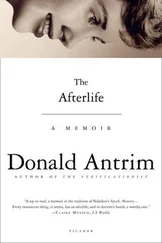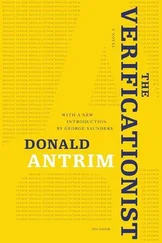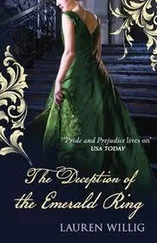“Can we stop here?” she said. They’d arrived at the lingerie store where, every year, before Christmas — usually at the last minute on Christmas Eve, at the end of one of his eleventh-hour gift-gathering runs — he came to buy her tap pants or a camisole, just as he’d done for his former wife on Christmases in years past. Marina, how was she? Was she still with Jeff?
“Let’s go in and get you a pair of fishnets,” he said, and they went in — the store was narrow — in single file. Two salesgirls were there to help them. One walked around the counter, toward Stephen, who raised his hands in the air, as if to prevent her from coming too close. Alice could easily be made upset if she thought she saw intimacy springing up between Stephen and another woman, even an attentive shopgirl or waitress, and he had learned to play down these innocent encounters. He announced to the women that he was shopping for his wife, and then put his arm around Alice and pulled her up beside him. “We’ll need a tall size,” he said.
He charged a pair of black woolen fishnets and two pairs of regular black stockings, and then they crossed the street and detoured off the avenue to look at a window display of men’s suits. He had no need of one, and in fact hadn’t bought one in quite some time, not since the world economy had taken its downturn.
“Let’s keep moving,” he said. A beautiful jacket in blue worsted wool was making him feel sad over — what? His reduced opportunities in life, probably. “How’re you doing?” he asked Alice. “Are you holding up?” She was leaning against him. Here and there around them, babies, pushed in strollers, came and went.
“I’m holding up,” she said.
The problem — the problem —was that he was no longer getting cast in the comic roles that had become, over years of acting in plays and, for a brief spell, on television, his strong suit. Or, no, maybe that wasn’t the root problem. In a way, though, it was, in part because the dropoff in work and income had increased his normal daily load of terror, but also because his heartbreaking difficulties onstage had amplified his sense of himself, of his Self , he should say, as somehow consisting in, or activated by — what was a fitting way to put this? — the willing community made by the laughter of audiences.
“Will you please let me hold those for you?” he asked, and reached for Alice’s shopping bags, the things he’d bought for her. She backed away from him quickly — had he startled her? — and said, “You’re too slow, man !”
“You’re right about that,” he said.
“Come on! You’re not even going to try?”
“Oh, God. You want me to fight you for the bags?”
“Yeah. Fight me.”
“Are you fucking with me right now?” he said, in the snarl of a stock comic-melodrama villain. But this didn’t come out funny — it was too unhinged-sounding, in tone and in volume — and her smile dropped, and she exclaimed, “Jesus, you don’t need to freak out !”
She handed over the two purple bags and the one little black one, and they continued up Madison. They stopped for a light, and he asked her, “Are we skipping Barneys?” The entrance to the women’s side of the department store was close by. Around the corner, over near Lexington Avenue, was the apartment of a hooker he’d visited in the nineties. Victoria.
What he hated about nice clothes was both wanting and not wanting to wear them. He disliked his own conspicuousness to himself, whenever he was out in the world expensively costumed. It was only the pleasure he felt in his tactile awareness of sewing and fabric, of the hands of the maker in the garment, that led him, again and again, to risk the danger of seeing himself — literally, reflected in the mirror of a bar, perhaps — as somehow faintly ridiculous.
It was an American problem, something that he felt only in America. He should have moved across the ocean when he’d had the chance, after his divorce from Marina. Though he’d never really had the chance. Where would he have gone? Rome? Berlin? London? How would he have worked? His old Neighborhood Playhouse friend Ned had decamped to the Netherlands some years back — when people still called it Holland — in order, Ned had told Stephen, to follow through on an artistic commitment to experimental performance, of which there always seemed to be so much in northern Europe; but then Stephen had heard through mutual acquaintances that Ned had married a Dutch woman, who’d helped him qualify for some form or other of enlightened state arts support, and that the two of them had taken to spending their days and nights smoking pot with expatriates in Amsterdam coffee shops, which sounded, to Stephen, both awful and wonderful.
“There’s nothing at Barneys this season. Everything’s got an Empire waist,” Alice was telling him. She said, “That cut makes me feel like a little girl in an Easter dress. A giant little girl.”
“It’s not my favorite look,” he agreed.
“It’s all right on some people,” she said, and he finished her thought for her, saying, “But not on you.”
“Is it my tits? Are my tits too small? Is that the problem?”
“Take it easy. It’s not your tits. Your tits are great,” he said, and went on, “Those dresses are weird. You know what I mean? You’re maybe a little too tall for an Empire waist, unless, I guess”—he made shapes with his hands in the air—“unless the skirt is very long.”
It was how they’d met and fallen in love, five years before — her absurd height. Alice and Stephen had been invited to the same dinner party, for which they’d arrived at the same time. They got into the elevator together, and he pressed the button for their friends’ floor, and she said, “That’s me, too, thanks,” and after that the doors closed and they avoided making eye contact, but on the way up they slipped and saw each other in the same instant and, in the shock of meeting her eyes, he exclaimed, in a whisper, “You’re so tall!” and she blushed, and his face got red, too. Later that night, after they’d both drunk a lot of wine, while their hosts were clearing up, she confessed to him that, in the elevator, he’d uttered aloud her first, fleeting thought whenever she met anyone, which was that she was tall — her noticing of herself being seen , being taken in, was part of her appealing self-consciousness: It was her come-on, and it was working on him — and she’d added that (though Stephen had hardly been the first man to lead with a comment on her height) no one had ever read her mind in quite the way he seemed to have done.
That Halloween afternoon on Madison Avenue, she sounded mildly manic. “You’re right! You’re right, as always. It’s not a big deal. I’m too tall for an Empire waist. It’s as simple as that! I try and it doesn’t work, and I try it and it doesn’t work, and I should know better by now, because it’s obvious !”
They were holding hands again. But he had a strong feeling that she was beginning to sink, that she was anxiously coming to feel and believe that she would somehow never be right. “Let’s get you something to eat,” he said, and she sighed and said, “Yeah, I’m starting to spin.”
“I can hear it,” he told her.
“You can?”
“Your Southern accent is coming out.”
“I don’t want to be too tall for you,” she cried.
“You’re not.”
“I’m a wee bit dizzy.”
“I’ll hold you,” he said.
A baby carriage was bearing down on them. He gripped her coat sleeve. On the next block, on the other side of Madison, was a coffee shop. He would have preferred a bar, but the one that he and Alice liked lay many blocks ahead. It wasn’t yet time for drinking, anyway. He guided her off the curb, between two closely parked cars, and directly out into the open avenue — there was a moment, he figured, before the light changed and traffic surged forward — where he maneuvered her diagonally across against the wind that funneled down between the buildings. “We’re almost there, come on,” he called. He heard cars rushing up behind them. He sped her across the final lane, onto the sidewalk, and then ten feet more, to the door of the restaurant.
Читать дальше
